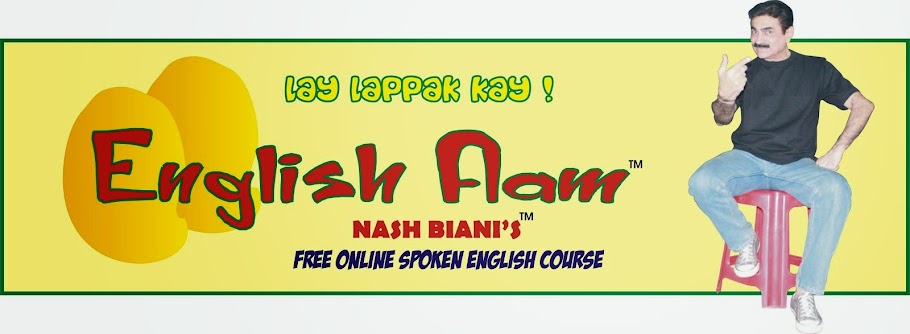Posted by Nash Biani
lesson 1
Page 4
ABSOLUTE BEGINNER COURSE
SPOKEN ENGLISH
Page 4
Hello and welcome to our Mehfil of English Aam. I'm Nash Biani with you and in today's English Aam Spoken English Video Mehfil we will look at the collocations on Page 2 of Absolute Beginner Course Lesson # 1. You were asked to write these collocations in your English Aam Spoken English Collocations Book. Please keep your book before you and join me. In this Video Mehfil and in this lesson we will see how these collocations can be useful to us and we will also practise speaking them.
COLLOCATIONS CAN BE A GREAT HELP TO IMPROVE ENGLISH SPEAKING SKILLS AND TO LEARN FLUENT SPOKEN ENGLISH
Collocations help us to improve our English speaking skills by giving us ready phrases to use at suitable times. Let us see how we can speak English more fluently with the help of these collocations.
Please copy the examples given on this page into your English Aam Spoken English Collocations Book.
1. small thing: This can be used to describe a small article like a key or an eraser (rubber) or a small computer part or other such things. But it can also be used to talk about a non-physical thing like an idea or a small misunderstanding.
2. small matter: you can use this when you are speaking of a small problem or maybe a small inconvenience or a small misunderstanding.
3. small problem: similar to small matter.
4. small issue: Also similar to small matter.
5. What's wrong with him?: You use this to enquire about what the matter is with someone. He appears to be ill or someone else says he is not well. Or you ask someone why a particular person seems upset or in a bad mood. Of course, it can used with other pronouns or nouns.
Examples:
1. 'What's wrong with her?'
2. 'What's wrong with you?'
3. 'What's wrong with those guys?'
4. 'What's wrong with Bob?'
6. What's happened to him?: Very similar to 'What's wrong with him?'
7. 'What's with him?' : Use this to ask why someone is upset or in a bad mood.
8. I'm fond of...': Use this to talk about something or somebody you like very much. A variation of this is
'I'm very fond of...'
Examples:
1. I'm fond of books.
2. I'm fond of ice-cream.
3. We're all fond of ice-cream.
4. I'm very fond of my son.
5. He's fond of...
6. She's fond of...
7. She's fond of mangoes.
8. She's fond of books.
9. She's fond of reading.
10. She's fond of singing.
11. She's fond of music.
12. You're fond of...
13. I'm fond of singing.
14. I'm fond of reading.
15. I'm fond of watching movies.
16. He's fond of reading.
17. Reema's fond of watching movies.
18. Salma's fond of reading books.
19. Reema's fond of movies.
9. I like: You will use this very often as you can see in these examples:
Examples:
1. I like movies.
2. I like books.
3. I like samosas.
4. I like sandwiches.
5. I like reading.
6. I like cricket.
7. I like you.
8. I like it.
10. we like
11. you like
12. he likes
13. she likes
14. it likes
15. Salma likes mangoes.
16. I remember: When something, some event or somebody from the past comes to your mind.
Examples:
1. I remember his name was Amit.
2. I remember her name was Seema.
17. I wasn't able to: When you were not able to do something.
Examples:
1. I wasn't able to send the email.
2. I wasn't able to open this software.
3. I wasn't able to do that.
4. I wasn't able to go there yesterday.
18. you weren't able to: When the person you are speaking with was not able to do something.
Example:
1. You weren't able to send it yesterday, so send it today.
19. We weren't able to
Example:
1. We weren't able to reach in time.
20. They weren't able to:
21. He wasn't able to:
Example:
1. He wasn't able to play the match.
22. She wasn't able to:
Examples:
1. She wasn't able to come yesterday.
2. She wasn't able to do it.
3. She wasn't able to talk to him.
4. She wasn't able to express herself.
23. I wasn't able to express my idea.
24. She talked with me.
25. She talked to me.
He talked to me.
You talked to me.
26. on behalf of...:
Example:
1. I welcome you on behalf of the company.
This spoken English lesson needs practising the collocations to improve fluency and increase confidence in speaking English.
We have looked at these collocations and practised them them to some extent in the Video Mehfil. But this is not enough. You have to practise more. On line, you can play the video again and again. Off line, you can use your English Aam Spoken English Collocations Book to practise the collocations. Remember, the more you practise, the better.
Please share in your social media circles by clicking on the buttons below.
You can join me on Facebook by liking my page. Just click on the Facebook button either in the panel on the right or at the very bottom of this page.
I would like you to follow me on Twitter by clicking on the button in the right hand panel.
And yes, your comments and queries are welcome. Please use the comments box below.
All the best, all the time J
LESSONS IN ABSOLUTE
BEGINNER COURSE
CHAPTER 1
|

